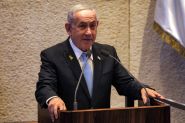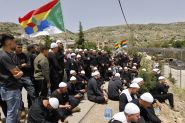- Home
- Middle East
- Urban Fighting Rages in Gaza as War Enters Third Month

©(Photo by MAHMUD HAMS / AFP)
Intense urban combat persisted in and around Gaza's largest cities on Thursday, as the deadliest conflict between Israel and the Palestinian group Hamas entered its third month.
Heavy urban combat raged in and around Gaza's biggest cities on Thursday, as the bloodiest-ever war between Israel and Palestinian group Hamas entered its third month since the militants' attack on October 7.
Prime Minister Benjamin Netanyahu said troops had closed in on the Khan Yunis home of Hamas's Gaza chief Yahya Sinwar, 61, vowing "it is only a matter of time until we find him."
His government responded angrily to United Nations chief Antonio Guterres after he invoked the rarely-used Article 99 of the UN charter, calling on the Security Council to push for a ceasefire.
Foreign Minister Eli Cohen said this would help Hamas and that Guterres was "a danger to world peace."
Gazans have been pushed south, turning Rafah near the Egyptian border into a vast camp for many of the 1.9 million Palestinians displaced by the conflict -- 80 percent of Gaza's population.
But air strikes have followed them.
Mass civilian casualties have sparked global concern, heightened by dire shortages caused by an Israeli siege that has seen only limited access to food, water, fuel and medicine.
Fighting in Khan Yunis means aid distribution has virtually stopped in the city, leaving Rafah the only area where limited supplies are reaching Gazans, according to UN humanitarian agency OCHA.
Israel has approved a "minimal" increase in fuel supplies to prevent a "humanitarian collapse and the outbreak of epidemics" and called on the international community to "increase its capabilities" to distribute aid.
OCHA chief Martin Griffiths said there were "promising signs" Israel may open the southern Kerem Shalom crossing to aid deliveries.
But Hamas has declared a "state of famine" in northern Gaza, saying no aid has arrived there since December 1.
And Israeli rights group B'Tselem said Thursday that the "miniscule amount of aid" allowed into the territory was "tantamount to deliberately starving the population."
In a morning briefing, it said troops had "killed Hamas terrorists and struck dozens of terror targets" in Khan Yunis and raided a military compound of Hamas's Central Jabalia Battalion.
Naval forces hit Hamas military compounds and infrastructure "using precise ammunition and firing shells."
The militant group said it had destroyed two dozen military vehicles in Khan Yunis, and in Beit Lahia in the territory's north.
Rocket fire from inside Gaza has continued to target Israel, where the projectiles have been intercepted by air defenses.
Heavy urban combat raged in and around Gaza's biggest cities on Thursday, as the bloodiest-ever war between Israel and Palestinian group Hamas entered its third month since the militants' attack on October 7.
Prime Minister Benjamin Netanyahu said troops had closed in on the Khan Yunis home of Hamas's Gaza chief Yahya Sinwar, 61, vowing "it is only a matter of time until we find him."
His government responded angrily to United Nations chief Antonio Guterres after he invoked the rarely-used Article 99 of the UN charter, calling on the Security Council to push for a ceasefire.
Foreign Minister Eli Cohen said this would help Hamas and that Guterres was "a danger to world peace."
Gazans have been pushed south, turning Rafah near the Egyptian border into a vast camp for many of the 1.9 million Palestinians displaced by the conflict -- 80 percent of Gaza's population.
But air strikes have followed them.
Mass civilian casualties have sparked global concern, heightened by dire shortages caused by an Israeli siege that has seen only limited access to food, water, fuel and medicine.
Fighting in Khan Yunis means aid distribution has virtually stopped in the city, leaving Rafah the only area where limited supplies are reaching Gazans, according to UN humanitarian agency OCHA.
Israel has approved a "minimal" increase in fuel supplies to prevent a "humanitarian collapse and the outbreak of epidemics" and called on the international community to "increase its capabilities" to distribute aid.
OCHA chief Martin Griffiths said there were "promising signs" Israel may open the southern Kerem Shalom crossing to aid deliveries.
But Hamas has declared a "state of famine" in northern Gaza, saying no aid has arrived there since December 1.
And Israeli rights group B'Tselem said Thursday that the "miniscule amount of aid" allowed into the territory was "tantamount to deliberately starving the population."
In a morning briefing, it said troops had "killed Hamas terrorists and struck dozens of terror targets" in Khan Yunis and raided a military compound of Hamas's Central Jabalia Battalion.
Naval forces hit Hamas military compounds and infrastructure "using precise ammunition and firing shells."
The militant group said it had destroyed two dozen military vehicles in Khan Yunis, and in Beit Lahia in the territory's north.
Rocket fire from inside Gaza has continued to target Israel, where the projectiles have been intercepted by air defenses.
Khalil Wakim, with AFP
Read more



Comments